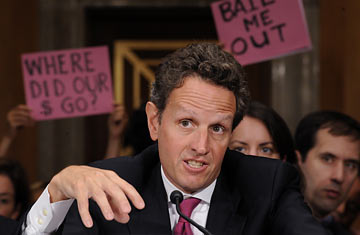
With protesters in the background, Treasury Secretary Timothy Geithner testifies on Capitol Hill.
It's nearly time to sing Happy Birthday to the Troubled Asset Relief Program. But few seem ready to don their party hats to cheer the plan that Congress approved nearly a year ago, giving the Treasury authority to spend up to $700 billion to rescue the nation's ailing banks.
Geithner, testifying on Thursday in front of an oversight panel reviewing the government's financial rescue efforts, faced a raft of questions about the effectiveness and the use of those funds. Elizabeth Warren, a Harvard professor and chairperson of the panel, said the average American has seen little or no benefit from the TARP spending. Damon Silvers, associate counsel for the AFL-CIO union, questioned whether TARP had really restored some of its biggest recipients, namely Bank of America, Citigroup and Wells Fargo, to health.
Representative Jeb Hensarling, a Republican from Texas, said he thought the Treasury Department had overstepped its authority when it used TARP funds to help the auto companies. Richard Neiman, who is the superintendent of the New York State Banking Department, said it looked like the administration was unlikely to meet its goal of modifying as many as 3 million mortgages.
For his part, Geithner responded that he thought the TARP program has largely been a success. "The nation's financial system is in better shape today than it was three months ago, six months ago and even on the eve of this recession," Geithner told the panel. He said adding capital to the banks was the right move. "Had we just gone and guaranteed all of the banks debts, I don't think we would have been as successful," he said.
Still, the Treasury Secretary noted that there was more work to be done in restoring the health of our nation's banks. In particular, Geithner repeatedly stated the need for bank regulation reform. "We did a lot of damage to our nation's financial system, and it is going to take a while to get through it," he said.
Geithner testified that the Treasury Department has not decided how long it would maintain the TARP program. So far, Geithner said money that has been paid back by banks has gone toward paying down the Treasury's debt, but he reserved the right to reinvest the money in other banks if that became necessary. Other TARP programs are ending: Geithner pointed to the emergency program to insure money market accounts, which will end later this month. Usage of other programs, such as the FDIC's guarantee of bank debt and the Federal Reserve's commercial paper funding program, are winding down as well.
Yet, other programs like the mortgage modification and foreclosure mitigation efforts could go on for some time. When asked why modifications hadn't reached more borrowers, Geithner answered that they are trying to do everything to expand mortgage help, but the problem defies a quick fix. "It is very unlikely that we will say that the housing market has got to the place in the next few months where it no longer needs help."
Warren asked whether the government has plans to rerun the stress tests. With unemployment already at the level the government called "worst case" just a few months ago, Warren said she thought it time to look at bank strength again, assuming even higher levels of unemployment. Geithner replied that the Stress Tests were stringent enough.
Silvers said some of the people the panel had talked to complained that the continued weakness of a number of the nation's largest banks was hurting the economy. He asked Geithner if he thought "zombie" banks were a problem. Geithner noted specifically that he didn't think Citigroup was a "zombie." He added that the fact that many of the banks have been able to raise private capital shows that TARP has improved their prospects.
In one of the more unusual exchanges, Hensarling wanted to know if Geithner thought the auto companies were banks. Geithner said under the definitions of TARP, he would call auto manufactures banks. "So would you call AT&T and American Airlines banks?" Hensarling asked. Geithner said no, and then clarified that at least at this moment he would not call AT&T or American Airlines banks. When asked about AIG, Geithner said the government didn't legally have the option to pay less than 100 cents on the dollar to its counterparties. In the past year, many people have criticized Geithner and former secretary Henry Paulson for allowing AIG to pass along much of the money it received from the government to Goldman Sachs and other investment banks. Geithner was also asked whether he thought the government's bailout efforts, which have actually allowed a number of banks like Bank of America, JP Morgan Chase and Wells Fargo to grow, has only exacerbated the too-big-to-fail problem in the banking business.
Geithner responded that he didn't think that was a failing of TARP. Instead, he said the fact that some banks continue to grow underscored the need for financial regulation reform, especially the need to give regulators the power to wind down large financial institutions.
"There was always a hold-your-nose-and-do-it aspect to the TARP because the bankers who caused the crisis were going to benefit," says John Irons, the research and policy director at the Economic Policy Institute. "I think that's where all the criticism comes from. But it seems to be the case that the program, while not a raging success, worked well enough to stop the worst from happening."
